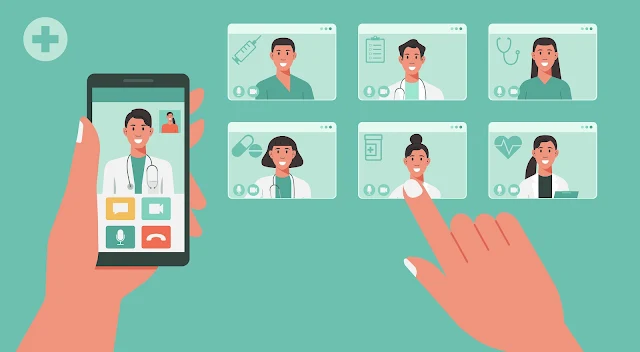AI in Healthcare
Whether it is about supporting improvements
in patient care outcomes, access to healthcare services, or patient experience,
AI does it all. It helps increase the efficiency and productivity of care
delivery, besides enabling clinicians and medical practitioners to spend more
time in direct patient care without burnout. Driven by AI, the digital-first
approach to healthcare has significantly gained credibility. Besides, the very
nature of the pandemic has boosted AI spending in healthcare. One of the examples
is the Mount Sinai Health System using artificial intelligence (AI) combined
with clinical data and imaging to analyze patients with COVID-19. Another one
is the Centers for Disease Control and Prevention1 (CDC) hosting an AI-driven bot on its website
for effective screening of coronavirus infections.
With AI spending in the healthcare and pharmaceutical industries expected to increase from $463 million in 2019 to over $2 billion by 2025 let us look at a few critical AI applications in healthcare.
Top 5 Real-World Examples
- Chatbots
Artificial Intelligence has the power to
increase primary care and triage via chatbots. Chatbots offer immediate
conversational responses and connecting becomes quite simple for patients. They
can save money on avoidable trips to the medical practitioner. When executed
effectively, chatbots can even aid healthcare providers to exceed patients’
expectations while improving patient outcomes. As chatbots adopt an all-in-one
communication approach, they encourage patients to share their health
information proactively, enabling medical practitioners to hone patient care
quality, mitigate costs, and boost patient satisfaction. AI thus enables smooth
flow and automation of primary care, leaving doctors to focus more on critical
and dreadful cases. Besides, AI solutions in healthcare are taking a more
humanized approach. Digital human platforms, equipped with integrations into
IBM, Amazon, Google, and Microsoft, enable healthcare providers to create and
deploy digital-human employees with much ease. Hospitals could thus leverage
digital humans as health assistants to provide empathetic, 24/7 aid to
patients.
- Robotic Surgeries
AI technology in the form of
collaborative robots has brought about a revolution in the field of surgery.
The revolution can be seen in terms of their speed and depth when making fine
incisions. Generally, the result of a surgery, especially a new or complex
process, can change with surgeons’ skills. AI utilization can minimize
case-to-case variations, improving the efficiency of even the most skilled
surgeons at the same time. As AI machines are precise, they mitigate the
probability of shudders or any accidental movements during surgery. For
instance, AI-controlled robots can offer a three-dimensional magnification for
articulation, while performing with better precision and miniaturization, known
to execute basic acts of precision cutting and stitching. Surgeons at the Maastricht
University Medical Center, Netherlands, utilized AI-assisted robotics to suture
very narrow blood vessels of .03 to .08 mm. Besides, AI machines can employ
data from past operations to devise new surgical methods.
- Virtual Nursing Assistants
AI systems alleviate virtual nursing
assistants available 24/7. From interacting with patients to directing them to
the most effective and best care setting, virtual nursing assistants could save
$20 billion3 annually for the healthcare industry. They can monitor patients,
answer their questions, and hence, offer quick answers in real-time. Today,
most of the applications of virtual nursing assistants enable regular and
consistent communication between healthcare providers and patients. As this
happens between patients’ office visits to their doctors, there are fewer
chances of unnecessary hospital visits or hospital readmission. AI-powered
virtual assistants provide personalized experiences to patients, helping them
detect their illness based on the symptoms, besides scheduling doctor
appointments and monitoring their health status. A virtual nursing assistant
guides you through the course of the treatment. This application of AI may be
adopted to enhance patient engagement and perfect their self-management skills
to prevent severe conditions from worsening. Care Angel, the first virtual
nurse assistant globally, can provide wellness checks through AI and voice.
- Precision Medicine
- Administrative Workflow Assistance
Automation
of administrative workflow is one of the AI applications in healthcare. It
guarantees that care providers prioritize urgent tasks, aiding doctors,
assistants, and nurses save time on their routine jobs. Applications of AI in
healthcare could lead to about $18 billion savings for the healthcare industry.
Technology like voice-to-text transcriptions offers help on the administrative
end of healthcare. They help automate non-patient care activities, such as
ordering tests, prescribing medications, and writing chart notes. AI in
healthcare examples includes a partnership between the Cleveland Clinic and
IBM. IBM’s Watson mines big data and assists physicians offer a highly
personalized and efficient treatment experience to their patients. Besides,
physicians can analyze medical papers in thousands using natural language processing
(NLP) and learn about varied treatment plans.
ASHOK KUMAR PATUR











No comments:
Post a Comment